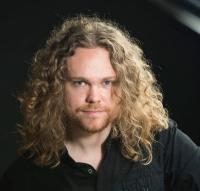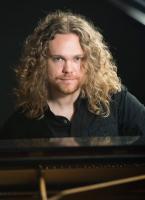Frank Nawrot is a KC-based composer who works in a variety of different genres and types of composition. He frequently composes work for saxophone, voice, piano, and concert band, to name a few, while also writing and producing commercial music and working on the soundtrack and sound effects for an original podcast. Nawrot's music has been performed around the world in places like Chicago, New York City, Hong Kong, Croatia, and Canada. In this interview, he talks about his influences as an artist, the unique energy created when performing for thousands of people, and his approach to composing music for podcasts.
*
Please introduce yourself and describe your music for new listeners.
My name is Frank Nawrot, I was born and raised in Grand Rapids, Michigan and am currently based in Kansas City. My music is rhythmic but often languid, sometimes experimental but always geared toward moving listeners to dance or cry.
What other artists or styles inspire and influence you as an artist? How do you find that these show up in your work?
This changes depending on the week. I will often hear a new song or artist and try to incorporate some part of what I like from their work into mine. Recently, I've been inspired by Tierra Whack, Vic Mensa, and Sierra Ferrel. Some of my mainstay influences include Julia Wolfe, Prince, and Meshuggah.
What is it like to hear your music performed live? Are there any specific performances that stand out in your mind, and why do those stand out as being significant?
It depends on the context. Because of the rhythmic nature of much of my music, it is best experienced when the audience is so close to the performers that they are being bombarded by their sweat. One such performance that stands out is a recent one in Chicago where I performed with some amazing musicians, including KC-based pianist Rachael Rule. It was a very intimate setting where there was little separation between the audience and five performers. The energy exchange between the two was amazing. A similar experience was always achieved when I was performing regularly in rock bands. There is nothing quite like performing for thousands of people who are dancing and singing along with you.
Your reputation is that the music you write is "accessible while still being challenging enough to provide audiences with a fresh and exciting experience." Do you focus more on making your music accessible for the musicians or for the audiences, or is it both? And how do you navigate the balance between accessible and challenging?
Honestly, I think the older and (hopefully) better I get at writing music, the more I incorporate new ("challenging") elements into my music without the listener being consciously aware that they're being exposed to something they've not yet heard. That way, they're hearing something new and feeling something new (maybe), but they aren't being turned off by being beat over the head with unfamiliar sounds. So, the upshot is, I try to keep my music accessible more than anything. But, at the same time, I want people to think. It's a tricky balancing act.
I don't think we've ever talked to someone who has composed music for podcasts on the blog! Can you tell us a little bit about your process for this and how it might differ from the other types of composition you do?
Providing a soundtrack, sound effects, etc. for the Tiny Tales podcast or any other multimedia thing (like movies) is an incredible experience. First of all, with the weekly podcast format, I am forced to exercise my creative muscles on a regular basis. So, even if I end up looking back on something and not liking it, I will at least have learned something new about my creative process. Probably the best part is the fact that my music takes a secondary role (if I'm doing my job right). For movies, for Tiny Tales, for anything in which the story must maintain primacy, I am challenged to elevate the story. I find that my biggest mistake is over-writing and distracting listeners from the story, but I think I am getting better and better at that.
What music are you absolutely raving about right now?
Tierra Whack, KAYTRANADA, and Woodie Guthrie, to name a few.
Revolutionary Suicide by Huey Newton. The autobiography of Black Panthers leader, Huey Newton. An important read to inspire the working class to take action, to pull themselves up by their bootstraps and create a better world.
The Left Hand of Darkness by Ursula Le Guin. Sci-fi is perhaps my favorite fictional genre. It can allow us to dream of what a better world may be like in the future. This classic is evocative, groundbreaking, and captivating.
Requiem for A Dream -- A tough watch for anyone triggered by substance abuse, but an extremely moving portrayal of the lives of junkies.
Musicology by Prince. Everyone knows the classic Prince albums, this is one of my favorites and I believe it is highly underrated.
The Wretched of the Earth by Frantz Fanon. Critical to understanding the role capitalism, imperialism, and colonialism has had in our world
Capital: A Critique of Political Economy by Karl Marx. Not in your collection, but it should be. To read it is to help understand the world in which we live. It is the first thorough analysis of our current economic epoch.


